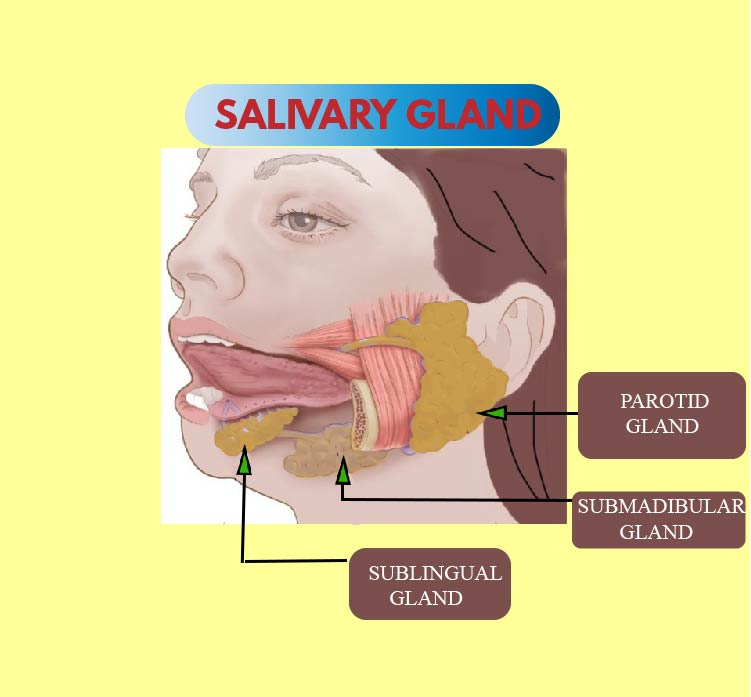
The role of the mouth in the digestion of food.
(a)Food is crushed into small pieces by the teeth
(b)The tongue helps in thorough mixing of food with saliva
(c)The food mixes with saliva and the enzyme amylase in the mouth
(d)All the above
Answer
588.9k+ views
Hint: The mouth serves as the starting point of the digestion. The chewing, blending, and breaking down of carbohydrates present in the food into simpler sugar molecules is the first step in the digestion process.
Complete answer:
The events of digestion that occurs in the mouth are:
-As a first step, the food is ground by the chewing process of our teeth. This process is called mastication.
-Now, the saliva produced by the salivary gland will mix the food completely. Saliva is secreted from the parotid, the submandibular, and the sublingual glands present in our mouth.
-saliva possesses immunoglobulins and lysozymes which have antimicrobial activity and inhibit the growth of certain bacteria in our mouth.
-Saliva has mucous that will moisten the food and also will buffer the food ph. Additionally, salivary amylase is abundantly present in the saliva. The salivary amylase converts the starch present in the food to simple disaccharide maltose sugar.
-The tongue cells produce lipase enzymes which aid in the breakdown of triglycerides present in the food.
-The two-chief process in the mouth is the chewing and wetting action of the food provided by the teeth and the saliva. Both these processes will shape the food we eat into a mass known as a bolus. Bolus will be easily swallowed.
-The tongue will help in swallowing the bolus by moving it from our mouth to the pharynx.
-The pharynx can either send the food to the lungs via the trachea or to the stomach via the esophagus.
-The closing of epiglottis (a cartilaginous flap) in the tracheal opening prevents the food from entering into the trachea. The food will now enter the esophagus and eventually to the stomach and intestine for the further digestion process.
The figure represents the oral cavity digestive system
So, the correct answer is’ All the above’.
Note: The process of digestion starts even before the first bite of the food (i.e.,) the smell that comes from the food will secrete more saliva in the mouth and after taking the first bite, the saliva production will increase further. Additionally, some substances can never be digested in our bodies. One such substance is the fiber. Humans do not have an enzyme to digest fibers in our bodies.

Complete answer:
The events of digestion that occurs in the mouth are:
-As a first step, the food is ground by the chewing process of our teeth. This process is called mastication.
-Now, the saliva produced by the salivary gland will mix the food completely. Saliva is secreted from the parotid, the submandibular, and the sublingual glands present in our mouth.
-saliva possesses immunoglobulins and lysozymes which have antimicrobial activity and inhibit the growth of certain bacteria in our mouth.
-Saliva has mucous that will moisten the food and also will buffer the food ph. Additionally, salivary amylase is abundantly present in the saliva. The salivary amylase converts the starch present in the food to simple disaccharide maltose sugar.
-The tongue cells produce lipase enzymes which aid in the breakdown of triglycerides present in the food.
-The two-chief process in the mouth is the chewing and wetting action of the food provided by the teeth and the saliva. Both these processes will shape the food we eat into a mass known as a bolus. Bolus will be easily swallowed.
-The tongue will help in swallowing the bolus by moving it from our mouth to the pharynx.
-The pharynx can either send the food to the lungs via the trachea or to the stomach via the esophagus.
-The closing of epiglottis (a cartilaginous flap) in the tracheal opening prevents the food from entering into the trachea. The food will now enter the esophagus and eventually to the stomach and intestine for the further digestion process.
The figure represents the oral cavity digestive system
So, the correct answer is’ All the above’.
Note: The process of digestion starts even before the first bite of the food (i.e.,) the smell that comes from the food will secrete more saliva in the mouth and after taking the first bite, the saliva production will increase further. Additionally, some substances can never be digested in our bodies. One such substance is the fiber. Humans do not have an enzyme to digest fibers in our bodies.

Recently Updated Pages
Master Class 11 Computer Science: Engaging Questions & Answers for Success

Master Class 11 Business Studies: Engaging Questions & Answers for Success

Master Class 11 Economics: Engaging Questions & Answers for Success

Master Class 11 English: Engaging Questions & Answers for Success

Master Class 11 Maths: Engaging Questions & Answers for Success

Master Class 11 Biology: Engaging Questions & Answers for Success

Trending doubts
One Metric ton is equal to kg A 10000 B 1000 C 100 class 11 physics CBSE

There are 720 permutations of the digits 1 2 3 4 5 class 11 maths CBSE

Discuss the various forms of bacteria class 11 biology CBSE

Draw a diagram of a plant cell and label at least eight class 11 biology CBSE

State the laws of reflection of light

Explain zero factorial class 11 maths CBSE




